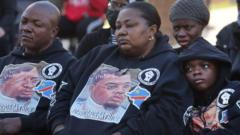As protests surge across Georgia for a third night in response to the government's halt of EU accession talks, tensions rise with clashes between demonstrators and police. President Zourabisvhili's claims of an illegitimate parliament and calls for fresh elections underline the turmoil in the nation, with many citizens and officials demanding clearer paths toward European integration.
Escalating Protests in Georgia Against EU Accession Halt

Escalating Protests in Georgia Against EU Accession Halt
Thousands in Tbilisi and other cities mobilize for the third consecutive night, expressing outrage over the government's suspension of EU negotiations amid increasing police presence and unrest.
Empty Line 4
Protests erupted once more in Tbilisi and other Georgian cities like Batumi and Kutaisi for the third consecutive night, as citizens voiced their anger against the government's recent decision to suspend negotiations for European Union accession. Riot police, heavily deployed near the parliament building, confronted large crowds with water cannon and tear gas, attempting to quell the unrest that has marked the past few days.
Georgia's pro-European Union President Salome Zourabisvhili stated in an interview with the BBC that she intends to remain in office until new parliamentary elections are conducted, despite the newly-elected parliament planning to select her successor on December 14. Zourabisvhili has labeled the current parliament as "illegitimate," claiming it arose amid allegations of electoral fraud in the recent elections. Discontent has spread within the civil service, with hundreds signing letters opposing the government's EU negotiation pause, arguing it undermines the country's best interests. Additionally, Georgian ambassadors to Bulgaria, the Netherlands, and Italy have resigned in protest.
The current ruling party, Georgian Dream, has been accused of steering the country away from EU ties towards closer relations with Russia. Following the party's claimed victory in the recent elections—denounced by opposition MPs as fraudulent—the European Parliament passed a resolution condemning the situation as part of Georgia's "worsening democratic crisis," laying the blame squarely on the ruling party. In a surprising statement, the Prime Minister announced that discussions about EU membership would be off the table until at least 2028.
Protests have also spread to journalists and advocates outside the public broadcaster in Tbilisi, who accuse it of serving the interests of the ruling party and undermining objective reporting. Writer and activist Lasha Bugadze voiced concerns over the public's exposure to Russian propaganda and misinformation.
In a joint effort, four opposition coalitions that won seats but are boycotting the parliament have called for new elections under international supervision. They declared, "Parties with a legitimate mandate will confront the illegitimate regime and the systemic violence against peaceful demonstrators and journalists."
The U.S. government condemned the excessive force used against protesters, emphasizing the Georgian people's strong desire for integration with Europe. Clashes on November 29 resulted in approximately 150 arrests, with police employing rubber bullets and tear gas against protesters. Tensions escalated further on November 30 as police intensified their crackdown, with the Prime Minister accusing demonstrators of violence against law enforcement, including attacks with Molotov cocktails and other projectiles. As the country navigates this turbulent period, the future of its EU aspirations hangs in the balance amid widespread civil unrest.
Protests erupted once more in Tbilisi and other Georgian cities like Batumi and Kutaisi for the third consecutive night, as citizens voiced their anger against the government's recent decision to suspend negotiations for European Union accession. Riot police, heavily deployed near the parliament building, confronted large crowds with water cannon and tear gas, attempting to quell the unrest that has marked the past few days.
Georgia's pro-European Union President Salome Zourabisvhili stated in an interview with the BBC that she intends to remain in office until new parliamentary elections are conducted, despite the newly-elected parliament planning to select her successor on December 14. Zourabisvhili has labeled the current parliament as "illegitimate," claiming it arose amid allegations of electoral fraud in the recent elections. Discontent has spread within the civil service, with hundreds signing letters opposing the government's EU negotiation pause, arguing it undermines the country's best interests. Additionally, Georgian ambassadors to Bulgaria, the Netherlands, and Italy have resigned in protest.
The current ruling party, Georgian Dream, has been accused of steering the country away from EU ties towards closer relations with Russia. Following the party's claimed victory in the recent elections—denounced by opposition MPs as fraudulent—the European Parliament passed a resolution condemning the situation as part of Georgia's "worsening democratic crisis," laying the blame squarely on the ruling party. In a surprising statement, the Prime Minister announced that discussions about EU membership would be off the table until at least 2028.
Protests have also spread to journalists and advocates outside the public broadcaster in Tbilisi, who accuse it of serving the interests of the ruling party and undermining objective reporting. Writer and activist Lasha Bugadze voiced concerns over the public's exposure to Russian propaganda and misinformation.
In a joint effort, four opposition coalitions that won seats but are boycotting the parliament have called for new elections under international supervision. They declared, "Parties with a legitimate mandate will confront the illegitimate regime and the systemic violence against peaceful demonstrators and journalists."
The U.S. government condemned the excessive force used against protesters, emphasizing the Georgian people's strong desire for integration with Europe. Clashes on November 29 resulted in approximately 150 arrests, with police employing rubber bullets and tear gas against protesters. Tensions escalated further on November 30 as police intensified their crackdown, with the Prime Minister accusing demonstrators of violence against law enforcement, including attacks with Molotov cocktails and other projectiles. As the country navigates this turbulent period, the future of its EU aspirations hangs in the balance amid widespread civil unrest.




















